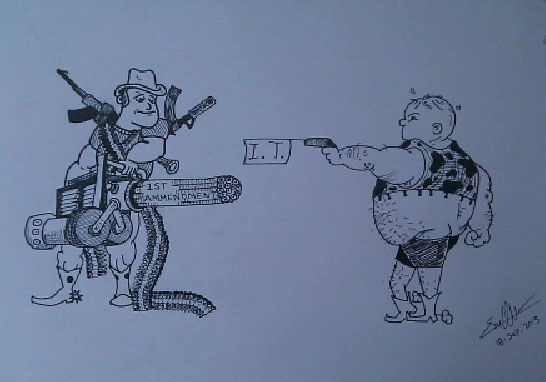Administrator takes down website

This archived article was written by: Nate Manley
First Amendment rights were compromised after access to the USU Eastern newspaper was restricted, says members of The Eagle staff.
Eric Mantz, Vice-Chancellor for Information Technology, thought The Eagle website had been hacked on Thursday, Sept. 5. He notified the newspaper adviser, Susan Polster, of the supposed hacking via email. Without any prior discussion of the policies and procedures for handling a possible security breach, Mantz informed Polster of his decision to take the website offline.
Skeptical of the hack, Polster suspected Mantz took the site down because of “advertisements,” referring to complaints Mantz vocalized during past meetings which involved the former Associate Vice-Chancellor of Arts and Humanities, Scott Henrie.
Polster phoned Mantz later that day to ascertain its source and impact on the server. Mantz identified the hacker as Les Bowen, the website author. Mantz presumed Bowen had “unauthorized access,” and “access without a contract,” based on Bowen’s name being present in server logs.
Bowen, the website author, told the Eagle in a phone interview this week, “This is not the first time there have been allegations of hacking, and just like previous times, it’s unsubstantiated.”
He not only created the original script and remained the only webmaster for the site since its creation in 2002, but he also owns the new domain name: USUEAGLE.COM. Bowen claims, “There was never a contract to breach,” which means he has authorized access to the website and an active connection to the server.
Mantz’s only role regarding The Eagle is to serve as an administrative contact to Bowen. The only role of USU Eastern’s IT department is to provide the server that hosts The Eagle, making it accessible to students and the public.
Bowen was paid by the JCOM department to build the current version site from the ground up, and the emails in February between Mantz, Polster and Bowen indicate the Price campus IT department was not able to identify what software was running on the server, because they had never taken an active roll in server maintenance or administration.
“The most involvement Eric and his department has had with server is rebooting the server upon failure and making an occasional backup,” Bowen said.
“The machine running the website today has been online since 2008, so in five years, the most active roll IT had played was taking the system down two weeks ago,” he said.
As vice-chancellor of information-technology, Mantz has the ability to take The Eagle offline. In the event that the site is taken offline, Mantz is required to restore accessibility of The Eagle to students and the general public, once a security threat is deemed inconsequential, Polster said.
She contacted Bowen, confirmed with him the hack was unsubstantiated, and requested the webpage to go back online. Mantz responded, “even if I put the site back up, it would not function right.” Polster proceeded to explain to Mantz that The Eagle’s design, content and maintenance is provided by Eastern’s JCOM Department, and any problem can easily be fixed by Bowen.
After a continued debate, Mantz ended the conversation saying, “I will see you in the chancellor’s office,” and hung up. According to Polster, he refused to bring The Eagle back online, refused to cooperate with her and Bowen, and ultimately denied everyone access to the content of The Eagle’s current and past journalistic works.
In emails from USU Assistant Professor of Journalism, Matthew LaPlante, about the site being taken down, he said The Eagle’s staff feels it is being held hostage by Mantz and the university. The student journalists cannot publish right now, and the entirety of their online work has been taken off the web.
LaPlante said, “Right now, the university is in the unenviable position of being in wholesale censorship of The Eagle’s works. That’s not hyperbole, it’s de facto censorship. It seems reasonable, that they should want to resolve this situation with haste and without ransom.”
Melanie Nelson, associate vice chancellor, is working with Mantz to get him to put The Eagle back online. After seven days of the site being down, Mantz sent an email to Polster and Nelson that “the website side of things is up. The only missing content that I can see (and probably the culprit that took it down) is the main page. I believe Susan knows how to load this content.”
Thirteen days after Mantz took the site offline, it can only be viewed by on-campus viewers. There is no access to The Eagle website off campus.
Eagle Editor Ashley Stilson says, “We keep getting complaints from students, parents, faculty and alumni that the website is down. All we want is for Mantz to put the website back up so it can be viewed both on and off campus.”
During Bowen’s journalistic career as an editor of five newspapers, he believes, “there is a tendency in the IT world to control things.” And by Mantz controlling the website and restricting access, is not only illegal, but a violation of the First Amendment.
The First Amendment provides for more freedom than just freedom of the press. And it should be understood, that the freedom of the press, guaranteed under the First Amendment, is not a right granted only to The New York Times, or to other newspaper publishers, but to the people, as citizens, to publish without the fear of censorship, regardless of whether that censorship comes from Congress or the president, or from the IT department at a remote campus in a small Utah town.




